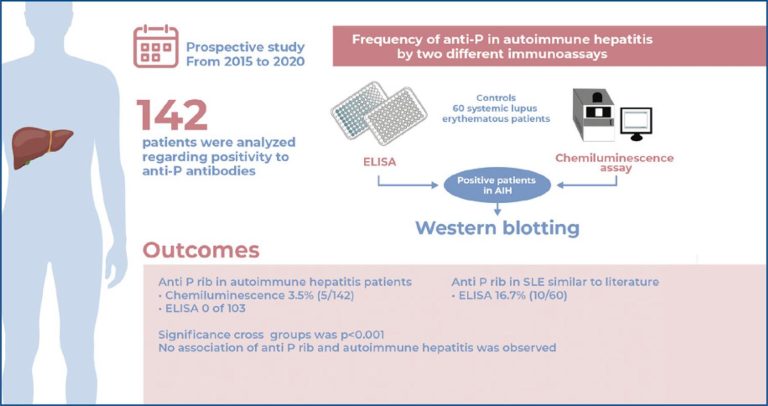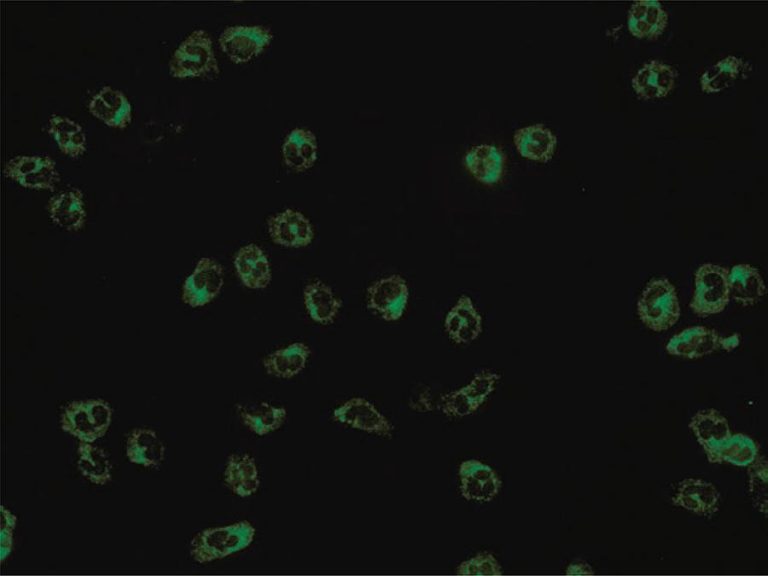10/Nov/2023
Anti-ribosomal P (anti-P) antibodies in patients with autoimmune hepatitis
DOI: 10.31744/einstein_journal/2023AO0375
Highlights Autoimmune hepatitis and systemic lupus erythematosus share several clinical features. Anti-P ribosomal antibody is a biomarker for systemic lupus erythematosus. The association between anti-P ribosomal antibody and autoimmune hepatitis has shown conflicting results. Our results showed no association between anti-P ribosomal antibody and autoimmune hepatitis. ABSTRACT Objective: Published studies have shown associations between anti-ribosomal P (anti-P) antibody and systemic lupus erythematosus with hepatic manifestations. This has been reported also in autoimmune hepatitis. However, the consistency of the latter association […]
Keywords: Autoantibodies; Enzyme-linked immunosorbent assay; Hepatitis, autoimmune; Luminescence; Lupus erythematosus, systemic; Ribosomal proteins
22/Jan/2020
Comparison between enzyme-linked immunosorbent assay and indirect immunofluorescence for detection of antineutrophil cytoplasmic antibodies
einstein (São Paulo). 22/Jan/2020;18:eAO5132.
View Article22/Jan/2020
Comparison between enzyme-linked immunosorbent assay and indirect immunofluorescence for detection of antineutrophil cytoplasmic antibodies
DOI: 10.31744/einstein_journal/2020AO5132
ABSTRACT Objective To evaluate the performance of enzyme-linked immunosorbent assay and indirect immunofluorescence methods for the detection of antineutrophil cytoplasmic antibodies in a routine clinical laboratory setting. Methods A total of 227 samples were tested by indirect immunofluorescence and enzyme-linked immunosorbent assay with antigen specificity for antiproteinase 3 and antimyeloperoxidase. The proportions of positive samples were compared by McNemar hypotheses and agreement was described by Cohen’s Kappa coefficient. Results The agreement of the tests was 96.5%, and the Kappa coefficient […]
Keywords: Antibodies, antineutrophil cytoplasmic; Autoantibodies; Autoimmune diseases; Enzyme-linked immunosorbent assay; Fluorescent antibody technique, indirect
12/Dec/2019
Performance evaluation of an indirect immunofluorescence kit for the serological diagnosis of dengue
DOI: 10.31744/einstein_journal/2020AO5078
ABSTRACT Objective: To evaluate the performance of indirect immunofluorescence for serological diagnosis of dengue virus in a population with high prevalence of arboviruses. Methods: Two-hundred serum samples from patients with clinical suspicion of dengue fever were tested by immunoenzymatic and indirect immunofluorescence assay BIOCHIP® mosaic. Specificity, sensitivity and Kappa coefficient were calculated. Discordant samples were tested by polymerase chain reaction for confirmation. Results: Of the 200 samples, 20% were positive and 80% negative for anti-dengue virus IgM antibodies in the […]
Keywords: Arbovirus infections; Dengue; Enzyme-linked immunosorbent assay; Fluorescent antibody technique; indirect; Serologic tests



